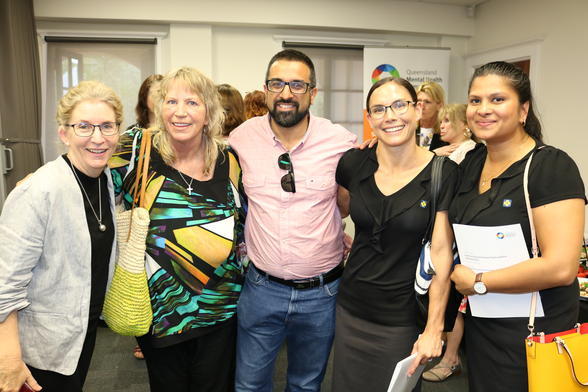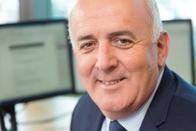093.jpg

Qld Mental Health and Drug Advisory Council members Jane Williams, Janice Crosbie and Hamza Vayani with Jacqueline Thistleton and Sara Shams of the Pharmacy Guild of Australia at the November council meeting.
Commissioner's viewpoint
Positive reforms to policing and mental health

Positive reforms to how we approach and manage instances where someone is experiencing a mental health crisis are detailed in our police interactions report released in October.
The Commission proposed eight options for reform involving police and first responders, mental health and community-based supports.
These options include better engagement of families and mental health professionals, and a stronger pathway to treatment and support: to improve outcomes for everyone in these circumstances.
The report was in response to the terrible tragedies in 2013 and 2014 that involved the fatal shooting by police of men thought to be experiencing a mental health crisis.
The reforms—many of which are now in place—are the culmination of two years of collaboration with police, health and other emergency services, community-based support services, and people with lived experience to improve interactions in crisis situations.
While it’s essential to continue to work towards reducing the need for police involvement when responding to people experiencing a mental health crisis in the community, we must ensure that when police do become involved, they have the necessary skills, and are supported by other services, to get people the right treatment and care.
This can only be achieved by taking a system-wide, collaborative approach that involves police, health and ambulance services, and the non-government sector.
Getting NDIS ready
From 1 July 2016, Queensland began transitioning to the National Disability Insurance Scheme (NDIS). The scheme is progressively rolling out across Queensland, with full implementation by 30 June 2019.
The NDIS is a fundamental change to the way mental health services are delivered in this country.
It brings both opportunity and challenge for people with a disability, including psychosocial disability, and for service providers across public, non-government and private sectors.
At the recent National NDIS Mental Health Conference in Sydney, I outlined the improvements to the scheme; and the impacts and benefits to consumers and the mental health system.
Ultimately we must not forget those people who are not eligible for an NDIS package, and address how to meet their ongoing needs, as well as the impacts on carers.
The Commission will keep advocating to improve the scheme on behalf of consumers, carers and service providers, including for those who will miss out.
It’s time to think creatively, laterally and rationally about where we go from here.
- Read on for more insight into this complex and transformational opportunity.
Finally, I urge you all to please take care of yourself, your loved ones and your colleagues as we head into the festive season.
Ivan Frkovic
Queensland Mental Health Commissioner
Connect on Linkedin
System reform
Police interactions

Our options paper Improving outcomes from police interactions: A systemic approach proposes eight options for reform to improve outcomes when people having a mental health crisis interact with police and other emergency services.
The options focus on prevention, recognising complexity, and providing first responders with the tools to appropriately respond—including options to improve systemic and integrated responses.
Much work has already been done to implement reform, including:
- expansion of the Police Communications Centre Mental Health Liaison Service
- vulnerable persons training for Police
- development of the Mental Health Support of Police Negotiators Program, providing 24/7 statewide support
- expansion of the co-responder model to Caboolture, Ipswich and the Sunshine Coast, as well as original locations in Cairns and Fortitude Valley
- commencement of the Partners in Prevention project to enhance responses in suicide crisis situations, which will work in collaboration with support agencies such as primary health networks.
Read the full paper, Improving outcomes from police interactions: A systemic approach.
Release of Fifth National Mental Health and Suicide Prevention Plan
It’s estimated around 4 million Australians will benefit from a strengthened mental health system under the release of this new plan, which is focused on streamlining efforts across eight priority areas.
Released on 17 October, the plan seeks to deliver a more coordinated approach to mental health, as well as evidence-based approaches and strategies to prevent suicide.
Collaborative government effort will focus on:
- achieving integrated regional planning and service delivery
- effective suicide prevention
- coordinated treatment and supports for people with severe and complex mental illness
- improving Aboriginal and Torres Strait Islander mental health and suicide prevention
- improving the physical health of people living with mental illness and reducing early mortality
- reducing stigma and discrimination
- making safety and quality central to mental health service delivery
- ensuring that the enablers of effective system performance and system improvement are in place
Given the Commission will release Queensland’s renewed whole-of-government mental health, drug and alcohol strategic plan next year, the release of this plan is timely and allows for us to ensure our statewide efforts are aligned to national priorities.
Learn more about the Fifth National Mental Health and Suicide Prevention Plan.
Improving service delivery

Improving service delivery for Aboriginal and Torres Strait Islander Queenslanders
The Queensland Productivity Commission recently released a draft report into service delivery in remote and discrete Aboriginal and Torres Strait Islander Communities.
The report examines expenditure and the service delivery system involving all three levels of government, numerous agencies, and Indigenous and non-Indigenous organisations.
The report considers how available resources can best be used to achieve healthy, safe and fulfilling lives for people living in these communities and will help inform the Commission’s renewed strategic plan.
Sponsorship round open
Looking to extend the reach of your mental health, drug or alcohol awareness event, conference or project?
Sponsorships of up to $10 000 are available for organisations seeking to bring about better mental health outcomes for their communities. The Commission’s current sponsorship funding round closes on 30 November.
Community hubs

The two Regional Mental Health and Wellbeing Hub leads, Jan Elston of Logan and Southern Moreton Bay Islands Hub (left) and Victoria Homer of Central Highlands Hub (right) delivered a workshop to attendees at the Rural and Remote Mental Health Symposium in Albury, NSW last month.
Jan and Victoria talked about their respective models of community-driven mental health and wellbeing initiatives under the hub project. Examples of activities used in their community hubs, such as the Wheel of Wellbeing (WoW) were provided to start conversations about good mental health and wellbeing, with engagement and interest in the workshop strong.
The hubs are funded by the Queensland Mental Health Commission.
WOW Yourself or WOW Your Community.
Like and follow the Central Highlands Hub Facebook page.
Mental health and wellbeing
Head to health
Head to Health is a new one-stop online portal of 370 mental health services and resources.
With trusted mental health resources, ranging from free apps, to forums and secure phone and chat services, Head to Health supports people to take control and get the support they need to take care of themselves and others.
With one in five Australian adults experiencing a mental illness each year, this new Australian Government resource has taken the guess work out of finding the right help at the right time.
Meet your psychologist online
Recent changes to Medicare mean people living in rural and remote areas may now have access to rebates for online videoconferencing services for psychology, social work and occupational therapy.
The changes recognise that all Australians should have access to these services, where and when they need them, regardless of where they live. For more information, talk to your GP.
Grants supporting the community
Results from the projects funded through the Commission’s Stronger Community Mental Health and Wellbeing Grant Program show the grants are making a positive impact in communities across Queensland. This month we focus on a project involving culturally and linguistically diverse workers.
Focus on migrant mental health at work
Evidence tells us that migrant workers can be some of the most hard to reach people when it comes to workplace wellness programs, often working in industries that don’t have a strong culture of supporting mental health and wellbeing.
With funding through the Commission’s grant program, the World Wellness Group, a multicultural health organisation targeted industries dominated by migrant women, such as aged care, childcare, disability support, cleaning and house-keeping, hospitality and call centres.
The project set about working with the Islamic Women's Association of Qld and Allianz Global Assistance to develop a suite of wellness sessions and programs that incorporated multicultural approaches to mental and physical wellbeing.
Now complete, the project measured its success through the achievement of:
- improved understanding by managers about the importance of wellness
- improved employee/employer engagement
- improved access to health information and wellness services among migrant workers
- improved mental and physical health and wellbeing among migrant workers.
Advisory Council
The Queensland Mental Health and Drug Advisory Council’s final meeting for 2017 was held at the Mental Illness Fellowship Queensland, Herston.
The meeting included:
- an update on the implementation of the Independent Patient Rights Advisers by its statewide coordinator, Scott James
- a presentation by Jeannine Kimber and Katherine Moodie, invited by Health Consumers Queensland, who shared their experiences as consumer and carer representatives on the Barrett Adolescent Centre Commission of Inquiry Implementation Steering Committee
- discussion on the current national strategies addressing Foetal Alcohol Spectrum Disorder (FASD)
- discussion on mental health and national security issues.
After the meeting, council members met with stakeholders from local non-government service providers, local government representatives and community leaders.
Sector news
Sector grants
The Queensland Council of Social Service (QCOSS) maintains a comprehensive list of grants available to community and social service organisations on its website.
- Visit the Queensland Council of Social Service.
Resources
- SANE Forums—Anonymous online support for people affected by mental illness, welcomes a new partner, Bipolar Life.
- SANE Australia—Asked its forum members what they don't like hearing when they were struggling. Read, 'What not to say to someone with Mental Illness'.
Events
- Promoting and measuring children's wellbeing forum: 23 November. The Australian Research Alliance for Children and Youth (ARACY) Middle Years Forum - Promoting and Measuring Children's Wellbeing will explore how to facilitate children's wellbeing and the positive outcomes that this can have for children and the wider community.
- Townsville Suicide Prevention Network Meeting: 28 November. An opportunity for all community members to get involved, build partnerships, raise awareness and initiate early intervention and awareness programs.
- Mental Health Australia Gathering: 28–29 November. To celebrate a year of mental health reform the Mental Health Australia AGM and a Members & Friends Dinner.
- National Indigenous Mental Health & Wellbeing Conference: **NOTE NEW DATES** 13-15 December. Brings together mental health workers and Aboriginal & Torres Strait Islander emotional and social wellbeing workers from organisations throughout Australia.
Get involved
- Butterfly Research Institute survey: closes end of November to advance the Australian knowledge-base on eating disorders and body image. The research will investigate Australians over the age of 18 in relation to their body esteem, and the impact these feelings have on their day-to-day lives. This is a significant study for Australia, spanning gender identity, location and age.
- Queensland Mental Health Week survey: closes end of November. Give your feedback on QMHW and tell us your aspirations for what it should look like next year.
- Take part in a research project: Effective Decision-Making Support for People with a Cognitive Disability is seeking those with an acquired brain injury or people with intellectual disability and their supporter to trial an education program and support package.
